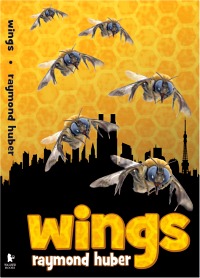Interview With Children's Author, Raymond Huber About His Bee Books
Raymond Huber has written 2 books for children aged 6 to 12: ‘Sting’ and ‘Wings’. Not only are these books about bees, they are adventure story books!
I thought I’d catch up with Raymond, and find out more about the
stories, and why he chose to write about bees. Below are Raymond’s
great answers to my questions.
Q&A With Raymond Huber
BuzzAboutBees: You’ve written a number
of books, but for obvious reasons, the books ‘Sting’ and ‘Wings’ are of
interest here - both are stories in which the main characters are bees!
That’s unusual (and refreshing) in an adventure. What made you
decide to choose bees for characters?
Raymond Huber: I was given a beehive on my 40th birthday and
became fascinated. But bees were also a gift to me as a children's
writer – here was a creature that talked by dancing; had magnetic
crystals and a selfless weapon; and kept the human race alive. I still
had to shape characters but different species suggested personalities:
eg. meditative bumblebees, edgy wasps.
BuzzAboutBees: Can you give us a brief outline – what are the books about?
Raymond Huber: Sting and Wings are
children’s novels about Ziggy, a young honey bee. He’s rejected by his
beehive, kidnapped by the human military and eventually discovers his
real family are a team of super bees (think Mission Impossible
with bees). When bees start disappearing, Ziggy and his family face
their biggest challenges: a deadly pesticide and a gang of Giant
Hornets. Animal fantasy meets sci-fi.

BuzzAboutBees: What was the inspiration for developing the stories?
Raymond Huber: I wanted to write the kind of book I loved as a kid — mixing thrills, humour and a very small hero (I loved The Hobbit).
My plots grew from news reports about the worldwide bee crisis and US
military training bees (true); and seeing some of my bees die from
pesticide poisoning.
BuzzAboutBees: Which are your favourite characters in the books, and why?
Raymond Huber: Torgo the hornet grew from my love of sci-fi movie monsters; Fang the snake reflects my love of puzzles; and Ziggy the bee is optimistic despite the odds. I suppose they're all bits of me.
BuzzAboutBees: Whilst reading the book,
will the reader learn anything about the life of bees and the problems
and challenges they face?
Raymond Huber: The story is told in first person/bee so the
reader sees life through his eyes. I tried to keep the biology
'reality-based' (the bees don't drive cars, they navigate) and there's
an appendix with bee facts. But the characters' emotions are
essentially human – I think young readers need characters they care
about and an exciting story; and they absorb the facts.
BuzzAboutBees: Are there any funny bits in the books?
Raymond Huber: I do enjoy word play – so much that my editor
made me cut half the puns. There's also some satire: the pesticide
corporation is called Slayer for good reason. There are also
some geeky TV geeks references, such as the bees' farewell, "Bee seeing
you", from The Prisoner.
BuzzAboutBees: I see you are a beekeeper. How long have you been keeping bees, and what do you like most about them?
Raymond Huber: I got my hobby hive about 10 years ago. I like
watching them flying, building, eating, cooking, defending. I love that
something so small can be so much: ”The little things are infinitely the most important” said Sir Arthur Conan Doyle (probably why Sherlock Holmes took up beekeeping).
BuzzAboutBees: What’s your favourite fascinating bee fact?
Raymond Huber: Bee dance is the second most complex language of all living creatures on Earth.
BuzzAboutBees: What’s your favourite honey recipe?
Raymond Huber: Honey baked lentils from the More With Less Cookbook (Google it). Makes monotonous lentils mellifluous.
BuzzAboutBees: What would be your top 5 tips for helping bees?
Raymond Huber:
- 1. Get to know bees – they aren't scary.
2. Plant things with flowers.
3. Avoid pesticides, especially the new systemic ones.
4. Leave a few weeds or let the lawn grow long (encourages diversity).
5. Buy local honey.
BuzzAboutBees: Thank you Raymond for your time!
Other Featured Books And Author Interviews
Links to books I have reviewed and Q&As with authors.
- Bees In Your Backyard
- The Good Bee
- Solitary Bees
- The Lives Of Bees
- Field Guide To The Bees Of Great Britain And Ireland
- Bumble Bees of North America
- Meadowland
- Buzz - The Necessity And Nature Of Bees
- Q&A with Phil Chandler - author of The Barefoot Beekeeper
- Q&A with Dr David Heaf - author of The Bee Friendly Beekeeper


